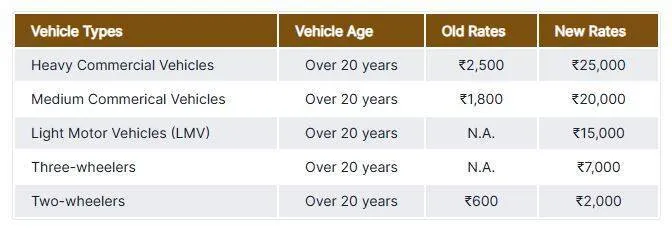

NEW DELHI: The central government has increased the fitness test fees of vehicles by up to ten times the current amount. The new measure has been amended in the rules of the Central Motor Vehicles Department. The revised fee structure is applicable nationwide.
According to recent amendments to the Central Motor Vehicles Rules in India, the age threshold for higher vehicle fitness fees has been reduced from 15 years to 10 years for several vehicle categories. The Ministry of Road Transport and Highways (MoRTH) of the Indian government is implementing the vehicle fee increase by dividing vehicles into three new age categories to discourage the use of older, more polluting vehicles. The three age categories are:
The revised fee structure applies to both registration renewal and fitness test fees (for commercial vehicles and private vehicles after 15 years), with costs increasing substantially for each older category. The new fees are part of the government's broader vehicle scrappage policy aimed at improving air quality and road safety.
The biggest increase has been made for heavy commercial vehicles. The fitness test fee for heavy commercial vehicles, such as trucks and buses over 20 years old, has been increased to ₹25,000 from the previous ₹2,500.
Medium commercial vehicles of the same age will be charged Rs 20,000 instead of the earlier Rs 1,800.
Light motor vehicles that are more than 20 years old will attract Rs 15,000.
Three-wheelers will be charged Rs 7,000.
Two-wheelers (motorcycle/scooter) that are more than 20 years old will face a renewal charge of Rs 2,000 instead of Rs 600.
Vehicles under 15 years old will also be charged a higher fee under the revised Rule 81. The new fitness test fees for vehicles under 15 years old are Rs. 400 for motorcycles, Rs. 600 for Light Motor Vehicles (LMVs), and Rs. 1,000 for Medium and Heavy Commercial Vehicles.

The government's new move is part of a drive to remove old and unsafe vehicles from the roads. Maintaining old vehicles at higher rates is expensive. The government hopes that the higher rates will force vehicle owners to abandon them or buy new ones.